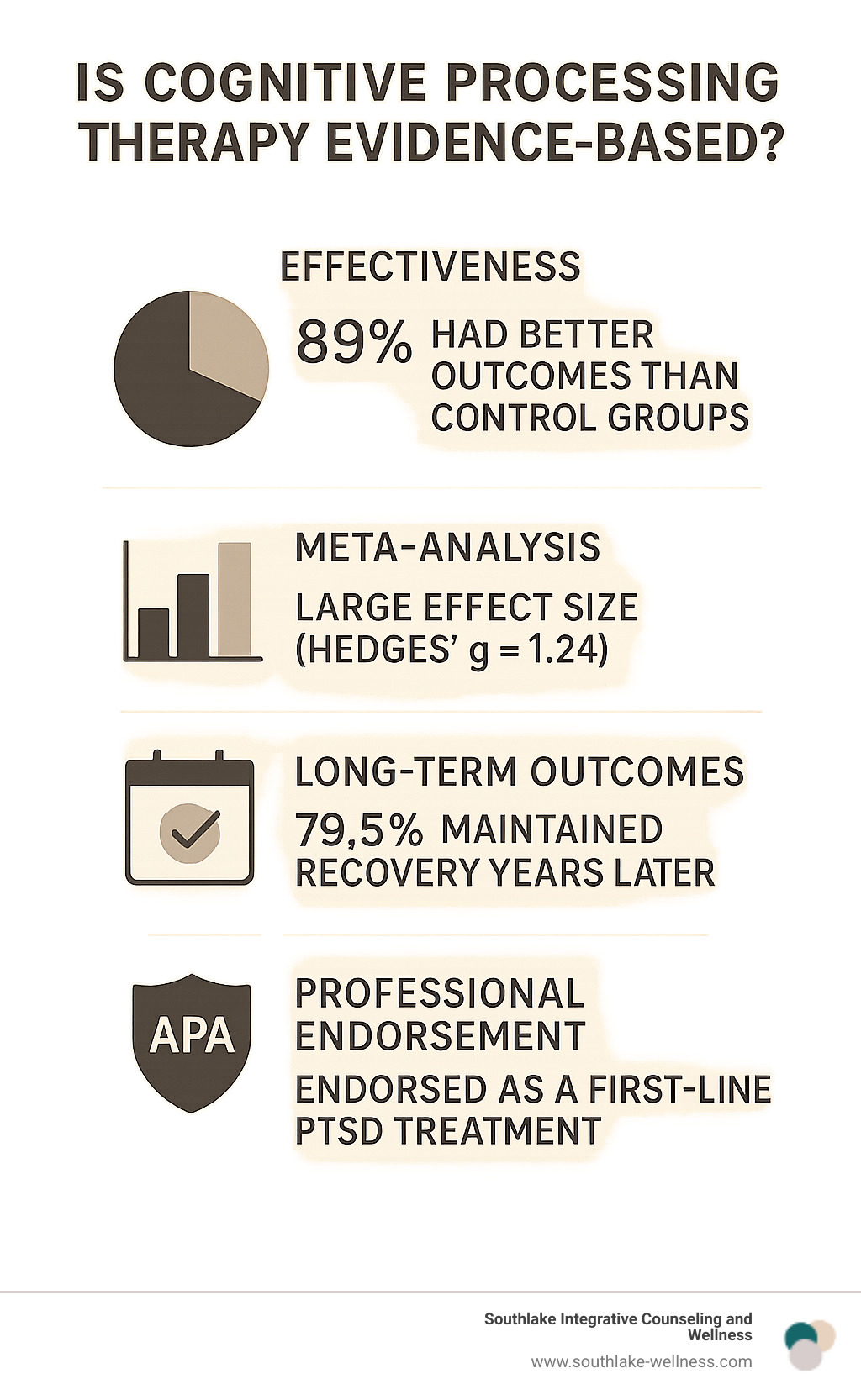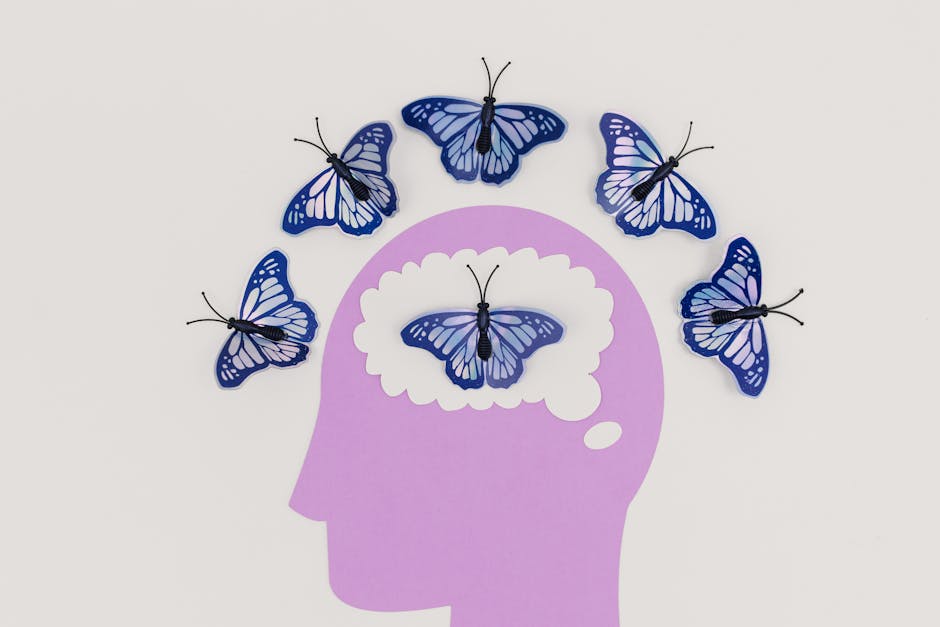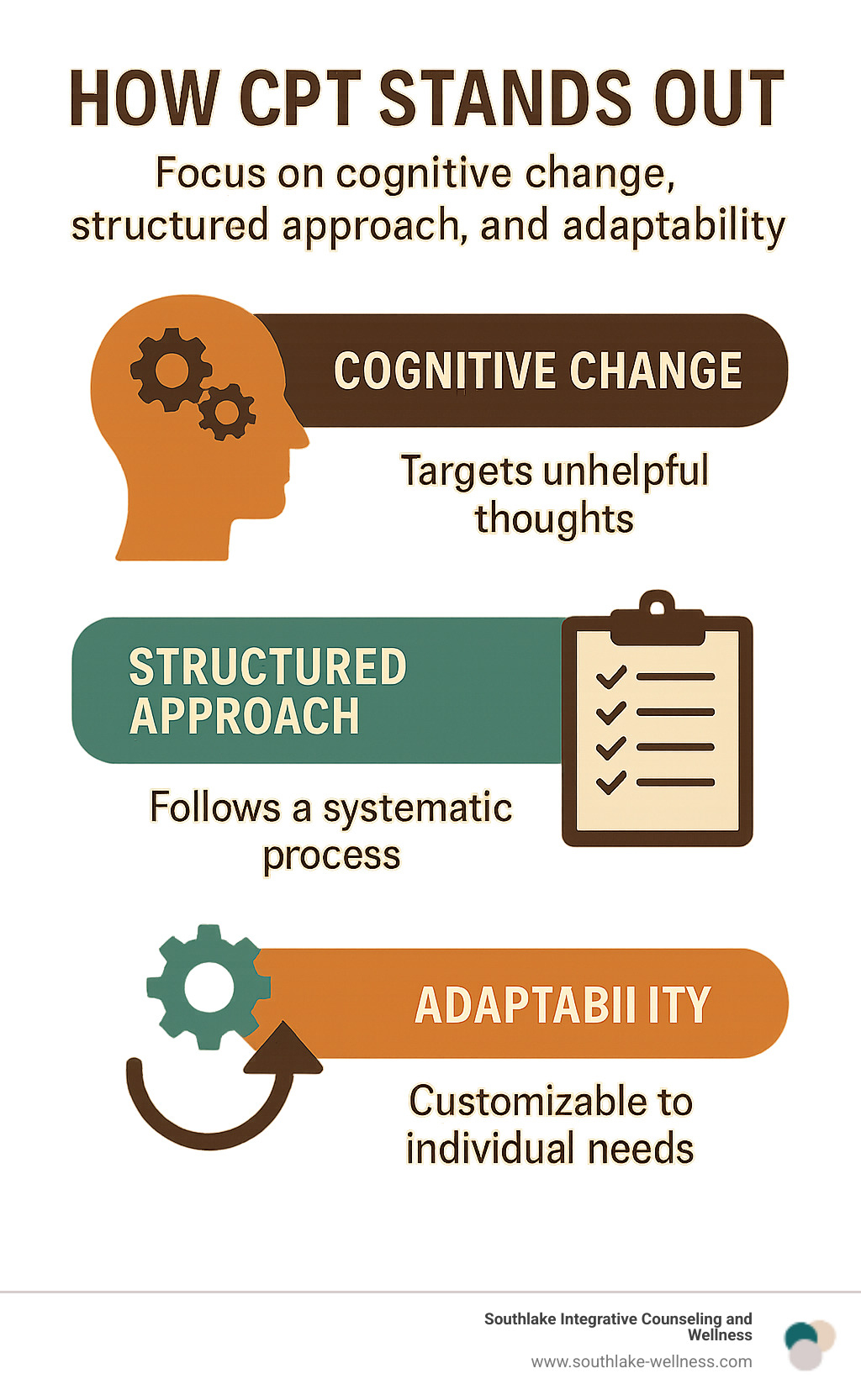
Why Evidence-Based Treatment Matters for PTSD Recovery
When searching for trauma therapy, the question is cognitive processing therapy evidence based deserves a clear, definitive answer. Yes, Cognitive Processing Therapy (CPT) is solidly evidence-based, with dozens of clinical trials demonstrating its effectiveness for treating PTSD and related conditions.
Quick Answer: CPT's Evidence Base
- Clinical support: Meta-analysis shows CPT outperformed inactive treatments with large effect sizes (Hedges' g = 1.24)
- Success rates: Average CPT participant fared better than 89% of those in control groups
- Long-term results: 79.5% of patients who no longer met PTSD criteria after CPT maintained recovery years later
- Professional recognition: Endorsed by the American Psychological Association as a first-line PTSD treatment
- Real-world effectiveness: Proven effective in routine clinical care settings, not just research studies
CPT stands out because it doesn't just treat symptoms - it targets the root cause of PTSD by helping people challenge and change the unhelpful beliefs that keep them stuck. Unlike approaches that focus solely on exposure or medication, CPT teaches practical skills for identifying and restructuring the distorted thoughts that fuel ongoing distress.
The research is overwhelming. Studies consistently show that most people who complete CPT experience significant improvement in PTSD symptoms, depression, and overall quality of life. These gains aren't temporary - follow-up studies demonstrate that improvements last for years after treatment ends.

Understanding Cognitive Processing Therapy (CPT): How It Rewires Your Brain
When you're living with PTSD, it can feel like your brain is stuck in a loop - replaying traumatic memories, flooding you with overwhelming emotions, and pushing you to avoid anything that might trigger those painful feelings. But here's the hopeful truth: is cognitive processing therapy evidence based for actually changing how your brain processes these experiences? Absolutely, and it does so in a remarkably practical way.
At Southlake Integrative Counseling and Wellness, we see CPT as perfectly aligned with our mind-body approach. This isn't just talk therapy - it's a systematic method for rewiring the neural pathways that keep you trapped in trauma responses. CPT is a specialized form of Cognitive Behavioral Therapy that focuses on the intricate dance between your thoughts, emotions, behaviors, and physical sensations.

What is CPT and What Are Its Goals?
Cognitive Processing Therapy was developed by Dr. Patricia Resick in the late 1980s, born from a simple but profound observation: PTSD happens when there's a clash between what you believed before your trauma and what you experienced during it.
Think about it this way - maybe you used to believe "I'm a strong person who can handle anything" or "The world is generally a safe place." Then trauma hits, and suddenly those beliefs don't fit anymore. Your mind gets stuck trying to make sense of this conflict, often leading to thoughts like "I must be weak" or "Nowhere is safe."
CPT helps resolve this internal battle by teaching you to examine these conflicting beliefs and find a more balanced, realistic middle ground. The therapy aims to help you understand how PTSD affects your daily life, reduce the emotional intensity of traumatic memories, and decrease the urge to avoid people, places, or activities that remind you of the trauma.
Most importantly, CPT works to improve your day-to-day functioning - helping you re-engage with relationships, work, and activities that bring meaning to your life. It's not about forgetting what happened; it's about changing how those experiences affect you moving forward. You can learn more about the clinical foundations at What is Cognitive Processing Therapy (CPT).
The Core of CPT: Challenging "Stuck Points"
The heart of CPT revolves around identifying what we call "stuck points" - those persistent, unhelpful thoughts that keep you trapped in trauma's grip. These aren't just negative thoughts; they're specific distorted beliefs that prevent healing and recovery.
Stuck points often sound like harsh self-criticism: "If I hadn't gone to that party, this never would have happened" or "I should have fought back harder." Sometimes they're sweeping generalizations about the world: "All people are dangerous" or "Nothing good will ever happen to me again."
Here's what makes CPT so effective - instead of just telling you to "think positive," your therapist guides you through Socratic dialogue, asking carefully crafted questions that help you examine the evidence for and against these beliefs. We use practical tools like the A-B-C worksheet, where you identify the Activating event, your Belief about it, and the Consequences of that belief.
This process of cognitive restructuring isn't about convincing yourself that trauma doesn't matter. It's about developing a more balanced, realistic perspective that acknowledges what happened while freeing you from the distorted thoughts that keep you stuck. This systematic approach is a cornerstone of our Trauma Therapy in Southlake, TX practice, where we help clients move from being controlled by their trauma to reclaiming their power over their own thoughts and reactions.
So, Is Cognitive Processing Therapy Evidence Based? The Definitive Answer
When you're struggling with PTSD, the last thing you want is to waste precious time and energy on treatments that don't actually work. That's why asking is cognitive processing therapy evidence based isn't just smart—it's essential. At Southlake Integrative Counseling and Wellness, we're committed to providing Evidence-Based Therapy Techniques that deliver real results, and CPT absolutely fits that bill.

The short answer? Cognitive Processing Therapy is absolutely evidence-based, with research backing that would make any scientist proud. But let's dig into what that really means for your recovery journey.
The Overwhelming Evidence: Why is cognitive processing therapy evidence based?
The research supporting CPT reads like a success story that keeps getting better. We're talking about dozens of rigorous clinical trials that have put CPT through its paces, and it consistently comes out on top.
Here's where things get really impressive: A major analysis combined results from 11 different studies involving over 1,100 people with PTSD. The findings? People who received CPT fared better than 89% of those who didn't receive active treatment. In research terms, that's what we call a "large effect size" (Hedges' g = 1.24)—basically, it means CPT makes a big difference.
But it gets even better. Even months after finishing treatment, CPT participants were still doing better than 82% of people in control groups. That's not just improvement—that's lasting change.
The mental health community has taken notice too. The American Psychological Association doesn't hand out endorsements lightly, but they've recognized CPT as a "strongly recommended" first-line treatment for PTSD. The U.S. Department of Veterans Affairs has done the same. When organizations this prestigious put their stamp of approval on a treatment, you know the evidence is solid.
What makes this research even more meaningful is that CPT works in real-world settings, not just in perfect research conditions. It's been tested with diverse populations, in different settings, and consistently proves effective. You can explore the detailed research through this meta-analytic review of CPT for PTSD.
How CPT Stands Out Among PTSD Treatments
You might be wondering what makes CPT special when there are other effective PTSD treatments available. The answer lies in CPT's unique focus on cognitive change—it doesn't just help you cope with trauma symptoms; it helps you fundamentally change how you think about the trauma and yourself.

CPT's structured approach guides you through a systematic process of identifying and challenging those "stuck points" we talked about earlier. The therapy includes cognitive restructuring techniques where you learn to identify and reframe unhelpful thoughts through guided questioning and practical worksheets. Some versions include written exercises (though these are often optional now), and most importantly, you develop practical skills for daily life that extend far beyond the therapy room.
Here's something that might surprise you: CPT often has lower dropout rates than other trauma therapies, especially when Southlake therapists use flexible approaches. This matters because the best treatment in the world only works if you can stick with it. CPT's adaptability—whether delivered individually, in groups, or even through telehealth—makes it accessible to more people in more situations.
Research comparing different PTSD treatments shows CPT holding its own beautifully. Studies have found it to be as effective as other gold-standard treatments, and in some cases, even superior for certain outcomes. What consistently stands out is CPT's emphasis on building cognitive flexibility—essentially teaching your brain new, healthier ways to process difficult experiences.
Long-Term Effectiveness: Is cognitive processing therapy evidence based for lasting change?
Here's where CPT really shines, and frankly, where many treatments fall short. Is cognitive processing therapy evidence based for creating lasting change? The research gives us a resounding yes.
Think about it this way: anyone can feel better temporarily, but what you really want is lasting recovery. CPT delivers on that promise. Follow-up studies tracking people for 1-2 years after completing treatment show that the improvements stick around. But even more impressive are the long-term studies.
Get this: among people who no longer met PTSD criteria right after finishing CPT, an incredible 79.5% were still maintaining their recovery when researchers checked in 4.5 to 10 years later. That's not just good—that's remarkable. Nearly three-quarters of all participants (73.7%) maintained their recovery over that same long-term period.
What this means for you is profound. CPT doesn't just offer temporary relief from symptoms. It provides you with a "mental toolkit" that keeps working long after your last therapy session. You learn skills for recognizing and challenging unhelpful thoughts, techniques for managing difficult emotions, and strategies for preventing relapse.
This long-term effectiveness makes sense when you understand how CPT works. Instead of just managing symptoms, you're rewiring your brain's response to trauma. You're building resilience and developing new neural pathways that support healthier thinking patterns. It's like the difference between taking pain medication for a broken bone versus actually setting and healing the bone properly—one provides temporary relief, the other creates lasting healing.
The CPT Journey: What to Expect in Therapy
Starting your CPT journey might feel overwhelming at first, but knowing what to expect can help ease those initial worries. At Southlake Integrative Counseling and Wellness, we've seen countless clients transform their lives through this structured yet compassionate process, and we're here to guide you every step of the way.

CPT typically unfolds over 12 therapy sessions, with each session lasting about 50-90 minutes depending on your specific needs. Most people meet with their therapist once a week, though we can adjust the frequency if you'd benefit from more intensive work initially.
One thing that makes CPT particularly effective is the out-of-session practice. Think of it like learning to play piano - the real growth happens when you practice between lessons. You'll use worksheets and apply new thinking skills in your daily life, which helps these changes become second nature.
The therapeutic alliance - that trust and connection between you and your therapist - forms the foundation of everything we do. Research shows this bond develops naturally within CPT's framework, creating a safe space where real healing can happen.
The Structure of CPT: From Education to Empowerment
CPT follows a thoughtful progression that builds skills gradually, ensuring you never feel thrown into the deep end. Each phase serves a specific purpose in your recovery journey.
Sessions 1-2 focus on psychoeducation and your Impact Statement. We start by helping you understand exactly what PTSD is and how it affects your thoughts, feelings, and behaviors. You'll write your first Impact Statement - essentially your current understanding of why the trauma happened and how it changed your view of yourself and the world. Don't worry if this feels difficult; it's meant to be a starting point, not a perfect analysis.
Sessions 3-5 involve processing the trauma and identifying stuck points. Here's where we dig deeper into how the traumatic event affected you. We'll help you spot those "stuck points" - those unhelpful beliefs that keep you feeling trapped. Using tools like the A-B-C worksheet, you'll start seeing the connections between specific thoughts and your emotional reactions.
Sessions 6-11 are where the real cognitive restructuring happens. This is the heart of CPT, where you'll learn to challenge and change those distorted thoughts. We'll work through the five key trauma themes - safety, trust, power and control, esteem, and intimacy. You'll use worksheets like the Challenging Questions tool to systematically question thoughts that aren't serving you well.
Session 12 brings everything together with your final Impact Statement and relapse prevention planning. You'll write a new Impact Statement, and most people are amazed at how different their perspective has become. We'll also create a plan for maintaining your progress and handling any future challenges.
Key Trauma Themes Addressed in CPT
Trauma has a sneaky way of twisting our most basic beliefs about life. CPT specifically targets five areas that trauma commonly distorts, helping you rebuild a more balanced worldview.
Safety often becomes the biggest concern after trauma. You might find yourself constantly scanning for danger or feeling like nowhere is truly safe. Through CPT, you'll learn to assess actual risk more accurately rather than living in constant fear.
Trust frequently takes a major hit. This includes trusting others, trusting yourself, and even trusting that good things can happen. We'll help you develop realistic expectations about trust rather than swinging between blind faith and complete mistrust.
Power and control issues show up when trauma leaves you feeling helpless. You might become overly controlling in some areas while feeling completely powerless in others. CPT helps you recognize where you do have control and how to exercise it healthily.
Esteem problems often manifest as harsh self-criticism or shame. Trauma can make you feel fundamentally flawed or worthless. We'll work on developing a more balanced and compassionate view of yourself.
Intimacy challenges affect your ability to connect with others. Trauma can make vulnerability feel dangerous, leading to isolation or unhealthy relationship patterns. Through CPT, you'll learn how to gradually rebuild your capacity for meaningful connections.
Adaptability of CPT
One of the things we love about CPT is how flexible it can be while still maintaining its effectiveness. This adaptability is part of why is cognitive processing therapy evidence based across so many different situations and populations.
Individual therapy allows for completely personalized attention, letting us tailor every session to your specific needs and pace. Group therapy offers the added benefit of connecting with others who understand your experience, though we know group work isn't right for everyone.
Telehealth delivery has been a game-changer, especially for clients who have transportation challenges or feel more comfortable starting therapy from home. Research confirms that online CPT can be just as effective as in-person sessions.
Cultural adaptations ensure that CPT works across different backgrounds and experiences. We integrate examples and approaches that resonate with your specific cultural context while maintaining the core healing principles.
Variable-length treatment means we can adjust the number of sessions based on your progress. While 12 sessions work well for most people, some clients need fewer sessions, and others benefit from additional time to fully integrate the changes. Your healing journey is unique, and your treatment should be too.
Frequently Asked Questions about CPT
Starting therapy can feel overwhelming, especially when you're already dealing with trauma. At Southlake Integrative Counseling and Wellness, we believe in transparent communication and want to address the most common concerns people have about CPT. These questions come up regularly in our practice, and we're here to provide honest, evidence-based answers.
Is CPT safe? Will it make my PTSD worse?
This might be the most important question you're asking yourself right now. The short answer is that CPT is safe when conducted by a trained therapist, though it's completely normal to feel anxious about diving into trauma work.
Some people do experience what we call temporary symptom increase during the early stages of CPT. Think of it like cleaning out an infected wound - it might hurt more initially, but it's necessary for proper healing. However, this symptom exacerbation is not the norm, and when it does happen, it's typically brief and part of the recovery process.
Here's what the research tells us: most clients show significant reduction in their PTSD symptoms by the end of treatment, even if they experienced some temporary discomfort along the way. In fact, studies have found that people on waiting lists sometimes experience more symptom worsening than those actively engaged in CPT treatment.
The key is working with a trained therapist who understands trauma and can guide you through any difficult moments. We monitor your progress closely and adjust our approach as needed. You're never alone in this process.
Is CPT effective for trauma other than combat?
Absolutely, and this is something we see in our practice every day. While you might hear about CPT in connection with veterans, it was actually originally developed for sexual assault survivors back in the 1980s. The beautiful thing about is cognitive processing therapy evidence based across different trauma types is that it addresses the core issue - how trauma changes our beliefs about ourselves and the world.
CPT has proven highly effective for people who've experienced sexual assault and childhood abuse, including physical, emotional, and sexual trauma that happened years or even decades ago. We've also seen excellent results with clients who've survived natural disasters like severe storms or accidents, as well as those who've experienced interpersonal violence such as domestic abuse or community violence.
The reason CPT works across such different experiences is that trauma affects our thinking patterns in similar ways, regardless of what happened. Whether someone is struggling with guilt after a car accident or trust issues after betrayal, CPT helps untangle those stuck points that keep people feeling trapped.
At our practice, we've worked with clients from all walks of life, and the evidence consistently shows that the type of trauma matters less than your willingness to engage with the process.
Do I need to write about my trauma in detail?
This question comes up in almost every initial consultation, and we completely understand why it's concerning. The good news is that detailed writing about your trauma is completely optional in modern CPT practice.
The original CPT protocol did include a written trauma account, but research has led us to a version called CPT-C (Cognitive only version) that focuses entirely on changing thought patterns without requiring you to write out what happened. Studies show that CPT is effective with or without the detailed narrative, so you can get the full benefits either way.
What's even more encouraging is that research shows lower dropout rates when the written account is optional. This means more people are able to complete treatment successfully when they're not required to write detailed descriptions of their trauma.
During our initial sessions, we'll discuss what feels right for you. Some clients find writing helpful for their processing, while others prefer to focus purely on identifying and changing the thoughts that are keeping them stuck. Both approaches are completely valid, and both are supported by solid research showing is cognitive processing therapy evidence based regardless of which path we take together.
The most important thing is that you feel comfortable and supported throughout your healing journey.
Conclusion: Reclaiming Your Life with Proven Therapy
The evidence is clear and overwhelming: is cognitive processing therapy evidence based? Absolutely. CPT stands as one of the most rigorously tested and effective treatments for PTSD available today. With dozens of clinical trials showing remarkable success rates and long-term benefits that last for years, CPT offers something precious to trauma survivors - real hope backed by science.
What makes CPT truly special isn't just its impressive research credentials. It's the way this therapy empowers you to reclaim your own narrative. Instead of being defined by what happened to you, CPT helps you rewrite the story by challenging those "stuck points" that keep you trapped. You'll learn to question thoughts like "It was my fault" or "The world is completely unsafe," replacing them with more balanced, realistic perspectives that allow you to move forward.
At Southlake Integrative Counseling and Wellness, we understand that healing isn't just about addressing symptoms - it's about nurturing the whole person. Our holistic mental healthcare approach perfectly complements CPT's structured framework. We recognize the powerful mind-body connection in trauma recovery, understanding that when your thoughts begin to heal, your entire being follows suit.
Every person's trauma journey is unique, which is why we believe deeply in personalized treatment plans. Whether you're dealing with combat trauma, sexual assault, childhood abuse, or any other traumatic experience, CPT can be adapted to meet your specific needs. Some clients thrive with the traditional 12-session approach, while others benefit from flexible timing or the cognitive-only version that doesn't require detailed writing about the trauma.
The beautiful thing about evidence-based treatment like CPT is that it gives you tools for life. You're not just getting temporary relief - you're building lasting skills for challenging unhelpful thoughts, managing difficult emotions, and navigating future challenges with greater resilience.
Taking that first step toward healing can feel overwhelming. Maybe you're wondering if therapy will really help, or if you're strong enough to face your trauma. These concerns are completely natural. But here's what the research tells us: most people who complete CPT experience significant improvement in their PTSD symptoms, depression, and overall quality of life.
You don't have to carry the weight of trauma alone anymore. We're here to walk alongside you on this journey toward healing, offering compassionate support grounded in proven science. To learn more about how our comprehensive approach can help you find your path to emotional balance and resilience, explore our therapeutic approaches.
Your healing journey matters. You matter. And with CPT's evidence-based foundation supporting you every step of the way, reclaiming your life isn't just possible - it's probable.